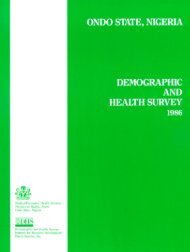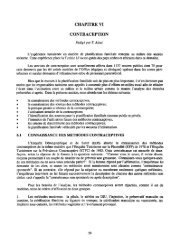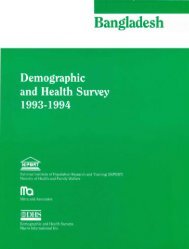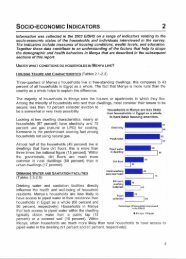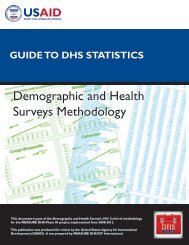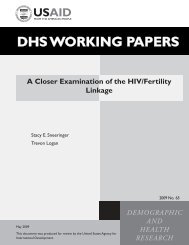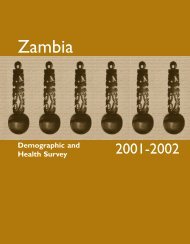Tanzania HIV/AIDS and Malaria Indicator Survey ... - Measure DHS
Tanzania HIV/AIDS and Malaria Indicator Survey ... - Measure DHS
Tanzania HIV/AIDS and Malaria Indicator Survey ... - Measure DHS
- No tags were found...
Create successful ePaper yourself
Turn your PDF publications into a flip-book with our unique Google optimized e-Paper software.
SUMMARY OF FINDINGSThe 2007-08 <strong>Tanzania</strong> <strong>HIV</strong>/<strong>AIDS</strong> <strong>and</strong> <strong>Malaria</strong><strong>Indicator</strong> <strong>Survey</strong> (THMIS) is the second population-based,comprehensive survey on <strong>HIV</strong>/<strong>AIDS</strong>carried out in <strong>Tanzania</strong>. The survey was commissionedby the <strong>Tanzania</strong> Commission for <strong>AIDS</strong><strong>and</strong> the Zanzibar <strong>AIDS</strong> Commission. The 2007-08 THMIS was implemented by the NationalBureau of Statistics in collaboration with the Officeof the Chief Government Statistician, Zanzibar.Macro International Inc. provided technicalassistance through MEASURE <strong>DHS</strong>, a USAIDfundedproject providing support <strong>and</strong> technicalassistance for the implementation of population<strong>and</strong> health surveys in countries worldwide. Otheragencies <strong>and</strong> organizations that facilitated thesuccessful implementation of the survey, throughtechnical or financial support, include the National<strong>AIDS</strong> Control Programme, the National<strong>Malaria</strong> Control Programme, the Ministry ofHealth <strong>and</strong> Social Welfare, the Zanzibar <strong>AIDS</strong>Control Programme, <strong>and</strong> Muhimbili UniversityCollege of Health Sciences.The 2007-08 THMIS is a nationally representativesurvey of 9,144 households selected from475 sample points throughout <strong>Tanzania</strong>. Allwomen age 15-49 <strong>and</strong> all men age 15-49 in thesehouseholds were interviewed individually. Thesample was designed to produce separate estimateson key indicators for the national level, forurban <strong>and</strong> rural areas, <strong>and</strong> for seven zones. Someestimates can be calculated at the regional level.The primary objectives of the 2007-08 THMISsurvey were to provide up-to-date information onthe prevalence of <strong>HIV</strong> infection among <strong>Tanzania</strong>nadults, <strong>and</strong> the prevalence of malaria infection<strong>and</strong> anaemia among children under age fiveyears.<strong>HIV</strong>/<strong>AIDS</strong> AND OTHER STISAwareness of <strong>AIDS</strong>. Almost all <strong>Tanzania</strong>ns age15-49 years have heard of <strong>AIDS</strong>. The proportionis on a par with results from both the 2003-04<strong>Tanzania</strong> <strong>HIV</strong>/<strong>AIDS</strong> <strong>Indicator</strong> <strong>Survey</strong> (THIS)<strong>and</strong> the 2004-05 <strong>Tanzania</strong> Demographic <strong>and</strong>Health <strong>Survey</strong> (T<strong>DHS</strong>). Awareness of <strong>AIDS</strong> isvery high in both Mainl<strong>and</strong> <strong>Tanzania</strong> <strong>and</strong> Zanzibar,amongst men <strong>and</strong> women in all age groups,<strong>and</strong> across background characteristics, with atleast 90 percent of people having heard of <strong>AIDS</strong>.Unfortunately, an in-depth underst<strong>and</strong>ing of<strong>AIDS</strong> is less widespread. Only 40 percent ofwomen <strong>and</strong> 44 percent of men have comprehensiveknowledge about <strong>AIDS</strong>. In this survey,comprehensive knowledge is defined as knowingthat consistent use of condoms during sexual intercourse<strong>and</strong> having just one uninfected faithfulpartner can reduce the chances of getting <strong>HIV</strong>,knowing that a healthy-looking person can have<strong>HIV</strong>, <strong>and</strong> rejecting the two most common localmisconceptions about <strong>HIV</strong> transmission <strong>and</strong> prevention.Comprehensive knowledge increases with increasinglevel of education <strong>and</strong> wealth quintile. Itis also considerably higher in urban areas than inrural areas. The lowest comprehensive knowledgeabout <strong>AIDS</strong> among men is found in Iringa<strong>and</strong> Zanzibar, while among women, the lowestlevels are found in Rukwa, Iringa, Shinyanga,Singida, <strong>and</strong> Pemba.Eight in ten women <strong>and</strong> seven in ten men age15-49 years know that <strong>HIV</strong> can be transmittedfrom mother to child through breastfeeding.However, only 53 percent of women <strong>and</strong> 44 percentof men know that <strong>HIV</strong> transmission risk canbe reduced if the mother takes special drugs duringpregnancy. Knowledge of both these facts iscomparatively higher among women <strong>and</strong> menwith higher education (completed primary <strong>and</strong>secondary or more education) <strong>and</strong> those in thefourth <strong>and</strong> highest wealth quintiles, but it islower among those age 15-19, those who havenever married, <strong>and</strong> those who never had sex.<strong>HIV</strong> Testing <strong>and</strong> Counselling. In <strong>Tanzania</strong>, 37percent of women <strong>and</strong> 27 percent of men havebeen tested for <strong>HIV</strong> at some time <strong>and</strong> receivedthe results. A small proportion (4 percent ofwomen <strong>and</strong> 3 percent of men) were tested but didnot receive the results.Overall, the proportion of women <strong>and</strong> men age15-49 who have been tested for <strong>HIV</strong> <strong>and</strong> receivedresults in the 12 months before the surveyhas increased from 5 percent of women <strong>and</strong> 7Summary of Findings | xvii



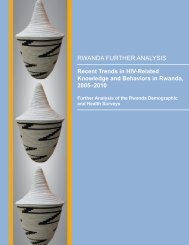
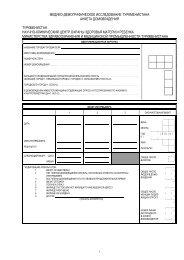
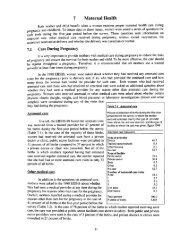

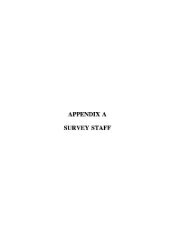
![Obtaining Informed Consent for HIV Testing [QRS4] - Measure DHS](https://img.yumpu.com/49850117/1/190x245/obtaining-informed-consent-for-hiv-testing-qrs4-measure-dhs.jpg?quality=85)
